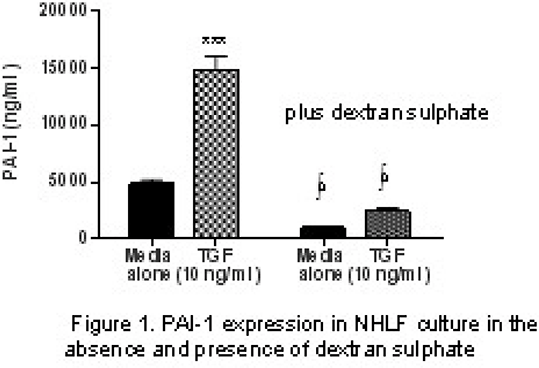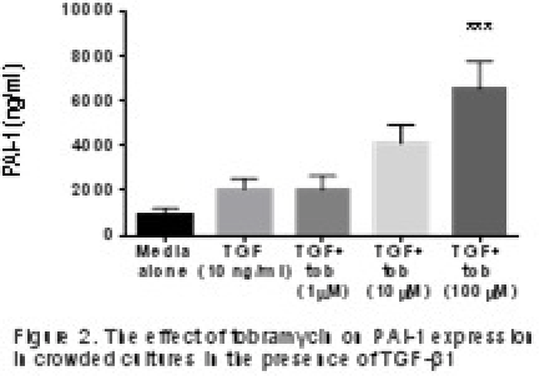| 227P London, UK Pharmacology 2016 |
Effects of tobramycin on lung fibroblast function and extracellular matrix remodelling
Introduction: TGF-β1 is expressed by lung fibroblasts and is involved in physiological processes such as collagen and proteoglycan synthesis and in pathological conditions such as fibrosis. Within tissues, TGF- β1 is negatively regulated by binding to the chondroitin/ dermatan sulphate proteoglycan decorin [1]. In a model of fibrosis, culture of fetal lung fibroblasts in the presence of 100 µg/ml dextran sulphate (>500 kDa) results in complete proteolytic processing of procollagen to collagen, and cross-linking into stable matrices, an effect mediated by ‘macromolecular crowding’ [2]. Here we report the effect of dextran sulphate on TGF-β1-mediated expression of the pro-fibrotic plasminogen activator inhibitor-1 (PAI-1) by normal human lung fibroblasts (NHLF) in this model. The aminoglycoside antibiotic tobramycin is widely used to treat gram-negative bacterial infection of the lung and interacts with dextran sulphate [3]. We therefore investigated the effects of physiologically relevant concentrations of tobramycin on PAI-1 expression in this model.
Method: NHLF were treated in FGM-2 media (Lonza) containing 0.3% FBS with and without crowding with 100 µg/ml dextran sulphate (>500 kDa). Effects of TGF-β1 (10 ng/ml) in the absence or presence of tobramycin for 48 hours were tested. PAI-1 was measured by ELISA (BioTechne). Fibroblast proliferation was measured using the CyQuant assay kit (Thermofisher). Data were analysed by ANOVA.
Results: TGF- β1 significantly (P<0.001) increased PAI-1 expression in uncrowded cultures, but not in those crowded with dextran sulphate (Fig 1). Dextran sulphate significantly (p<0.001) inhibited PAI-1 expression in media alone and in the presence of TGF-β1. Tobramycin had no effect on PAI-1 expression in the absence of dextran sulphate. However, tobramycin dose-dependently increased PAI-1 expression in crowded cultures in the presence of TGF- β1 (Figure 2), but not in the absence. Tobramycin had no significant effect on fibroblast proliferation under these conditions.


Conclusions: In an in vitro model of lung fibrosis, the anionic polymer dextran sulphate significantly inhibited the effect of TGF-β1, indicating that dextran sulphate may bind and limit the activity of TGF- β1. Conversely, tobramycin reversed the inhibitory effect of dextran. Since TGF- β1 is held in the lung tissue matrix predominantly in inactive form bound to negatively charged glycosaminoglycans then tobramycin may potentiate the activity of TGF- β1 to have a pro-fibrotic effect in the lung.
References:
1. Yamaguchi Y et al. (1990) Nature 346:281-4.
2. Chen CZ et al. (2009) Br J Pharmacol 158:1196-209.
3. Lu E et al. (2009) J Microencapsul 26:346-354

